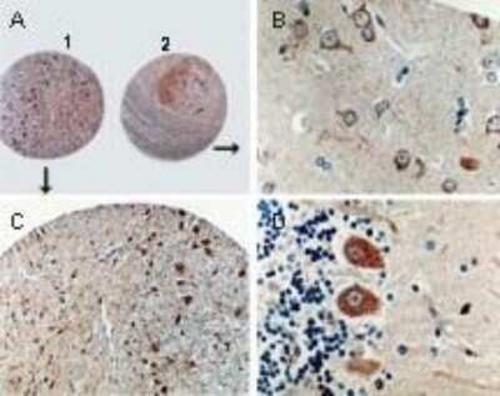Caspase 8 (CASP8) Rabbit Polyclonal Antibody
Frequently bought together (2)
beta Actin Mouse Monoclonal Antibody, Clone OTI1, Loading Control
USD 200.00
Transient overexpression lysate of caspase 8, apoptosis-related cysteine peptidase (CASP8), transcript variant A
USD 665.00
Other products for "Caspase 8"
Specifications
| Product Data | |
| Applications | FC, ICC/IF, IHC, IP, Simple Western, WB |
| Recommended Dilution | Western Blot: 1:1000-1:2000, Immunohistochemistry: 1:10-1:500, Immunocytochemistry/ Immunofluorescence: 1:10-1:500, Immunoprecipitation: 1:50-1:200, Immunohistochemistry-Paraffin: 1:1000-1:5000, Immunohistochemistry-Frozen: 1:10-1:500, Flow Cytometry, Simple Western |
| Reactivities | Human, Mouse, Rat, Gerbil |
| Host | Rabbit |
| Clonality | Polyclonal |
| Immunogen | Recombinant catalytically active human Caspase-8 protein was used as immunogen. |
| Formulation | Store at -20C. Avoid freeze-thaw cycles. |
| Concentration | lot specific |
| Purification | Whole antisera |
| Conjugation | Unconjugated |
| Storage | Store at -20°C as received. |
| Stability | Stable for 12 months from date of receipt. |
| Predicted Protein Size | 55.4 kDa |
| Gene Name | caspase 8 |
| Database Link | |
| Background | Apoptosis occurs during normal cellular development and involves dramatic changes in cellular structure. Disruption of apoptosis may contribute to cancer as well as other autoimmune diseases. Caspase family of cysteine proteases has been shown to play a key role in apoptosis. Caspase-8 is a 55 kDa cytosolic protein that is synthesized as an inactive pro-enzyme. Activation of caspase-8 involves a two-step proteolysis: the cleavage of caspase-8 to generate a 43 and a 12 kDa fragment which is further processed to 10 kDa. The p43 is then cleaved to yield p26 and the release of the active site containing p18. |
| Synonyms | ALPS2B; CAP4; Casp-8; FLICE; MACH; MCH5 |
| Reference Data | |
| Protein Families | Druggable Genome, Protease |
| Protein Pathways | Alzheimer's disease, Apoptosis, Huntington's disease, NOD-like receptor signaling pathway, p53 signaling pathway, Pathways in cancer, RIG-I-like receptor signaling pathway, Toll-like receptor signaling pathway, Viral myocarditis |
Documents
| Product Manuals |
| FAQs |
| SDS |
{0} Product Review(s)
0 Product Review(s)
Submit review
Be the first one to submit a review
Product Citations
*Delivery time may vary from web posted schedule. Occasional delays may occur due to unforeseen
complexities in the preparation of your product. International customers may expect an additional 1-2 weeks
in shipping.






























































































































































































































































 Germany
Germany
 Japan
Japan
 United Kingdom
United Kingdom
 China
China




